-
 Despite its frequent recall, in legislation, jurisprudence and doctrine, the concept of “public order” is not only a vague, poorly determined and content-variable one, but also among the most controversial ones. Hereinafter, the authors of this study are trying to submit to the attention some of its characteristic traits, and then to provide some guidelines with regard to the implementation ex officio of “reasons of public order” by the Court for judicial review in the lawsuit.
Despite its frequent recall, in legislation, jurisprudence and doctrine, the concept of “public order” is not only a vague, poorly determined and content-variable one, but also among the most controversial ones. Hereinafter, the authors of this study are trying to submit to the attention some of its characteristic traits, and then to provide some guidelines with regard to the implementation ex officio of “reasons of public order” by the Court for judicial review in the lawsuit. -
 Nu există vreun temei pentru a crea o ordine de preferință a declarațiilor, în sensul reținerii celor date în faza de judecată, în detrimentul celor date în faza de urmărire. Principiul liberei aprecieri a probelor nu permite distincția dintre probele administrate în faza de urmărire și cele administrate în faza de judecată și se opune ca cele din urmă să fie luate în considerare în detrimentul celor dintâi, numai pe criteriul fazei procesuale în care au fost obținute. Singurul criteriu care trebuie avut în vedere atunci când o probă este fie reținută pentru a contura o situație de fapt, fie înlăturată din ansamblul tuturor probelor existente în dosar este cel al coroborării probei în discuție cu celelalte probe administrate.
Nu există vreun temei pentru a crea o ordine de preferință a declarațiilor, în sensul reținerii celor date în faza de judecată, în detrimentul celor date în faza de urmărire. Principiul liberei aprecieri a probelor nu permite distincția dintre probele administrate în faza de urmărire și cele administrate în faza de judecată și se opune ca cele din urmă să fie luate în considerare în detrimentul celor dintâi, numai pe criteriul fazei procesuale în care au fost obținute. Singurul criteriu care trebuie avut în vedere atunci când o probă este fie reținută pentru a contura o situație de fapt, fie înlăturată din ansamblul tuturor probelor existente în dosar este cel al coroborării probei în discuție cu celelalte probe administrate. -
 Article 322 section 5, second phrase of the (Romanian) Code of Civil Procedure provides that review of a final and binding decision in the Appellate Court or non-appealed and of a ruling passed by a court of last resort upon merits called forth may be requested „whether, following the rendering of the decision, a court order which grounded the decision under review claimed was abated or amended.” The author, in light of the practice of the European Court of Human Rights, considers that the purport should be interpreted narrowly. Accordingly, the scope of Article 322 section 5, second phrase of the (Romanian) Code of Civil Procedure may cover uncertified court orders exclusively (referred to as binding) because only these can be amended / abated under appeal or recourse, and not judgments passed within right of review procedures such as review or appeal for annulment, on account of complying with the principle of legal certainty.
Article 322 section 5, second phrase of the (Romanian) Code of Civil Procedure provides that review of a final and binding decision in the Appellate Court or non-appealed and of a ruling passed by a court of last resort upon merits called forth may be requested „whether, following the rendering of the decision, a court order which grounded the decision under review claimed was abated or amended.” The author, in light of the practice of the European Court of Human Rights, considers that the purport should be interpreted narrowly. Accordingly, the scope of Article 322 section 5, second phrase of the (Romanian) Code of Civil Procedure may cover uncertified court orders exclusively (referred to as binding) because only these can be amended / abated under appeal or recourse, and not judgments passed within right of review procedures such as review or appeal for annulment, on account of complying with the principle of legal certainty. -
 Un element care trebuie avut în vedere atunci când se abordează problematica disciplinei Drept parlamentar este frecvența utilizării acestui termen în literatura de specialitate, precum și în programele studiilor de licență sau masterat ale facultăților cu profil juridic, ori ale unor facultăți de științe politice, în care disciplina Dreptul parlamentar s-a studiat și, poate, se studiază încă, ca disciplină/materie de sine stătătoare. Chiar și în limbajul comun termenul de drept parlamentar este suficient de bine încetățenit, ceea ce poate da naștere unei percepții publice eronate, asupra autonomiei sale, ca ramură individuală a sistemului de drept, față de alte ramuri ale dreptului, și, în mod deosebit, față de dreptul constituțional ...
Un element care trebuie avut în vedere atunci când se abordează problematica disciplinei Drept parlamentar este frecvența utilizării acestui termen în literatura de specialitate, precum și în programele studiilor de licență sau masterat ale facultăților cu profil juridic, ori ale unor facultăți de științe politice, în care disciplina Dreptul parlamentar s-a studiat și, poate, se studiază încă, ca disciplină/materie de sine stătătoare. Chiar și în limbajul comun termenul de drept parlamentar este suficient de bine încetățenit, ceea ce poate da naștere unei percepții publice eronate, asupra autonomiei sale, ca ramură individuală a sistemului de drept, față de alte ramuri ale dreptului, și, în mod deosebit, față de dreptul constituțional ... -
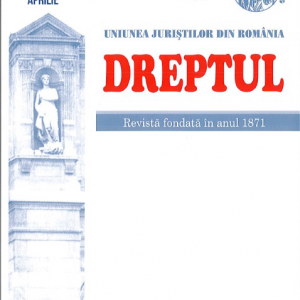 Marcarea Centenarului Marii Uniri (1918–2018) a ridicat fundamentala problemă a abordării unitare, din perspectiva succesiunii în timp a reglementărilor, impactului lor social și evoluției ideilor, a dezvoltării juridice a României la scara ultimului secol, relevându-se, totodată, și pe această bază, mizele prezentului și provocările viitorului pe termen mediu și lung. Acest eveniment a oferit ocazia unei analize complete și în spiritul adevărului istoric a fenomenului complex și major al unificării juridice interbelice – legislativă, judiciară și doctrinară – ca parte inseparabilă a procesului de desăvârșire a unității naționale și fundament organic al științei dreptului și culturii juridice românești.
Marcarea Centenarului Marii Uniri (1918–2018) a ridicat fundamentala problemă a abordării unitare, din perspectiva succesiunii în timp a reglementărilor, impactului lor social și evoluției ideilor, a dezvoltării juridice a României la scara ultimului secol, relevându-se, totodată, și pe această bază, mizele prezentului și provocările viitorului pe termen mediu și lung. Acest eveniment a oferit ocazia unei analize complete și în spiritul adevărului istoric a fenomenului complex și major al unificării juridice interbelice – legislativă, judiciară și doctrinară – ca parte inseparabilă a procesului de desăvârșire a unității naționale și fundament organic al științei dreptului și culturii juridice românești. -
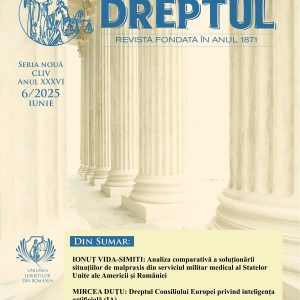
-
 The author intends to make a synthesis of the main amendments brought by the legislator to the civil liability institution, by adopting the present Civil Code, also analyzing the main sources of inspiration underlying the new regulation. The chosen approach is a comparative one, the civil liability institution being analyzed both from the perspective of the Civil Code of 2009 and of the Civil Code of 1864. The study aims to emphasize that the new regulation is a codification of the doctrine and of the case-law, in a necessary attempt to adapt the Romanian legislation to the soft-law standards of the European Union in this matter, as well as to the other international regulations.
The author intends to make a synthesis of the main amendments brought by the legislator to the civil liability institution, by adopting the present Civil Code, also analyzing the main sources of inspiration underlying the new regulation. The chosen approach is a comparative one, the civil liability institution being analyzed both from the perspective of the Civil Code of 2009 and of the Civil Code of 1864. The study aims to emphasize that the new regulation is a codification of the doctrine and of the case-law, in a necessary attempt to adapt the Romanian legislation to the soft-law standards of the European Union in this matter, as well as to the other international regulations. -

-
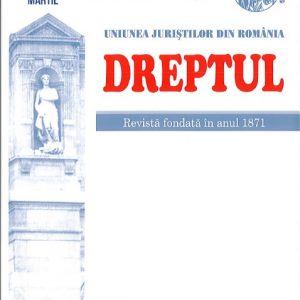 According to Article 46 of the Romanian Constitution, „The right to inheritance is guaranteed”. Thus, we find that the constitutional text is of a maximum concision. The correct and complete understanding of the text requires, indeed, some developments firstly related to the branch of the civil law, mainly in matters of successions but also to the real rights, being concerned, especially, the institution of the property right. Thus, in the following article, there will be presented briefly the following aspects, which we consider to be of interest for the right to inheritance: the notion of inheritance and the specific terminology, the types of inheritance, the conditions of the right to inheritance, the successoral option, the right of the foreign citizens and of the stateless persons to acquire, by inheritance, the private property right on lands in Romania.
According to Article 46 of the Romanian Constitution, „The right to inheritance is guaranteed”. Thus, we find that the constitutional text is of a maximum concision. The correct and complete understanding of the text requires, indeed, some developments firstly related to the branch of the civil law, mainly in matters of successions but also to the real rights, being concerned, especially, the institution of the property right. Thus, in the following article, there will be presented briefly the following aspects, which we consider to be of interest for the right to inheritance: the notion of inheritance and the specific terminology, the types of inheritance, the conditions of the right to inheritance, the successoral option, the right of the foreign citizens and of the stateless persons to acquire, by inheritance, the private property right on lands in Romania. -
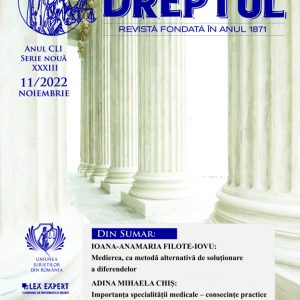 The issue of the content of the crime is treated through the prism of two criminal legislations and doctrines - of Romania and of the Republic of Moldova in the present study. The objective pursued by the authors is the substantiation of the perspective of a unique concept of approaching crime as a basic institution of criminal law in the Romanian space. The criminal legislation of the Soviet Union had an excessive impact on the evolution of the criminal legislation of the Republic of Moldova. Even today, some Moldovan criminal law institutions, including crime law, are approached from the perspective of concepts and perceptions that characterized the Soviet doctrinal system. As a result of this research, the authors, using mainly the comparative method of studying law, have argued the theoretical foundations that may constitute the basis for the approximation of the above-mentioned doctrines in addressing the content of the crime. However, the good knowledge of the issue of the legal content of the crime allows the description of the crimes by the strict observance of the quality standards of the criminal law, thus ensuring the principle of legality of the incrimination.
The issue of the content of the crime is treated through the prism of two criminal legislations and doctrines - of Romania and of the Republic of Moldova in the present study. The objective pursued by the authors is the substantiation of the perspective of a unique concept of approaching crime as a basic institution of criminal law in the Romanian space. The criminal legislation of the Soviet Union had an excessive impact on the evolution of the criminal legislation of the Republic of Moldova. Even today, some Moldovan criminal law institutions, including crime law, are approached from the perspective of concepts and perceptions that characterized the Soviet doctrinal system. As a result of this research, the authors, using mainly the comparative method of studying law, have argued the theoretical foundations that may constitute the basis for the approximation of the above-mentioned doctrines in addressing the content of the crime. However, the good knowledge of the issue of the legal content of the crime allows the description of the crimes by the strict observance of the quality standards of the criminal law, thus ensuring the principle of legality of the incrimination. -
 In the study hereby, the author sets under review the body search institution, from the perspective of theoretical and practical approaches. Body search has a distinct character, being undertaken in some cases separately from other evidence procedures, but it is also frequently undertaken on home searches, detention or arrest of a person. The author puts forward, within the study, the main legal regulations applicable in the field of body search, focusing on the new amendments to the new Code of Criminal Procedure, and reasoning some de lege ferenda proposals.
In the study hereby, the author sets under review the body search institution, from the perspective of theoretical and practical approaches. Body search has a distinct character, being undertaken in some cases separately from other evidence procedures, but it is also frequently undertaken on home searches, detention or arrest of a person. The author puts forward, within the study, the main legal regulations applicable in the field of body search, focusing on the new amendments to the new Code of Criminal Procedure, and reasoning some de lege ferenda proposals. -
 The study analyzes the opinion on the repeal of the filter procedure when the review in the civil trial is within the competence of the High Court of Cassation and Justice. The author presents the analysis of the manner the filter procedure was regulated by the Law No 134/2010, the Civil Procedure Code and the arguments for which it considers that the repeal of this procedure is not justified. The result of the study is reflected in the opinion according to which the filtering procedure had to be maintained, for the settlement of the reviews in the civil trial, by the supreme court. The filter procedure was first introduced in the civil processual legislation by the Government Emergency Ordinance No 58/2003. Those provisions introduced a new procedure of settlement of the review, irrespective of the court which settled the review, that of the admissibility in principle of the review, prior to the actual settlement of the application for review, which carried out the preliminary examination of the application for review. By the Law No 134/2010 the filter procedure has been regulated only in case the review was settled by the High Court of Cassation and Justice. By the Law No 310/2018, amending and supplementing the Civil Procedure Code, the filtering procedure has been repealed although, in the initial form, it was proposed to put the text of Article 493 of the Civil Procedure Code in agreement with the provisions of the Decision of the Constitutional Court No 839/2015, which has declared unconstitutional the phrase „or that the review is manifestly unfounded”. In this respect, the text of Article 493 (5) of the Civil Procedure Code should have been as follows: „In case the panel unanimously agrees that the review does not meet the formal requirements, that the grounds invoked and their development do not fall within those provided by Article 488, it shall cancel the review by a reasoned decision, pronounced without the summoning of the parties, which is not subject to any means of appeal. The decision shall be communicated to the parties”. Maintaining the filter procedure, in our opinion, contributes to decongesting of the supreme court to settle the reviews that do not meet the conditions for exercising this extraordinary means of appeal.
The study analyzes the opinion on the repeal of the filter procedure when the review in the civil trial is within the competence of the High Court of Cassation and Justice. The author presents the analysis of the manner the filter procedure was regulated by the Law No 134/2010, the Civil Procedure Code and the arguments for which it considers that the repeal of this procedure is not justified. The result of the study is reflected in the opinion according to which the filtering procedure had to be maintained, for the settlement of the reviews in the civil trial, by the supreme court. The filter procedure was first introduced in the civil processual legislation by the Government Emergency Ordinance No 58/2003. Those provisions introduced a new procedure of settlement of the review, irrespective of the court which settled the review, that of the admissibility in principle of the review, prior to the actual settlement of the application for review, which carried out the preliminary examination of the application for review. By the Law No 134/2010 the filter procedure has been regulated only in case the review was settled by the High Court of Cassation and Justice. By the Law No 310/2018, amending and supplementing the Civil Procedure Code, the filtering procedure has been repealed although, in the initial form, it was proposed to put the text of Article 493 of the Civil Procedure Code in agreement with the provisions of the Decision of the Constitutional Court No 839/2015, which has declared unconstitutional the phrase „or that the review is manifestly unfounded”. In this respect, the text of Article 493 (5) of the Civil Procedure Code should have been as follows: „In case the panel unanimously agrees that the review does not meet the formal requirements, that the grounds invoked and their development do not fall within those provided by Article 488, it shall cancel the review by a reasoned decision, pronounced without the summoning of the parties, which is not subject to any means of appeal. The decision shall be communicated to the parties”. Maintaining the filter procedure, in our opinion, contributes to decongesting of the supreme court to settle the reviews that do not meet the conditions for exercising this extraordinary means of appeal. -

-
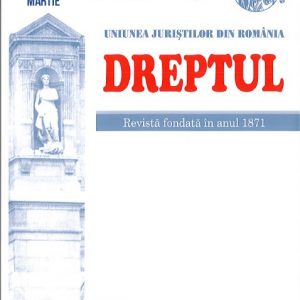 The purpose of the present analysis is to determine the applicable legal regime to certain procedural acts made in bad faith in relation to the abuse of rights theory, and the lis pendens (same trial pending in the same time before two or more panel of judges) and joined cases institutions. The analysis started from a particular case in which a claimant filed two statements of claim having the same object in two considerably distant moments (7 years between them) against the same defendant. The only aspects which the claimant drafted differently in the second case file, in order to eliminate risk of identity, were the claims’ phrasing and some additional arguments in his favour which were not inserted in a proper form in the first case file. Nevertheless, through the second statement of claim, the claimant himself raised the lis pendens exception, in order to send the second case file in front of the initial judge and thus to overcome his incapacity to invoke additional arguments in the first case file. The court vested with the judgment of the lis pendens exception stated that the exception is applicable and in the case at hand. Thus, it has sent the second file to be analyzed together with the initial statement of claim. In addition to this, the court fined the claimant for misconduct represented by filing intentionally the two statement of claims having the same object. In consequence, in the present article we have analyzed the conditions to be met in order to state the presence of an abuse of rights in the light of the lis pendens and joined cases institutions. We have identified the purpose for the regulation of these legal institutions and the similarities and differences between them. In addition to this, we addressed the conduct which the court should have in order to correctly analyze the two statements of claim which are object of the lis pendens exception. Finally, our theoretical conclusions related to the three institutions were applied to our particular case, in order to prove the presence of an abuse of right.
The purpose of the present analysis is to determine the applicable legal regime to certain procedural acts made in bad faith in relation to the abuse of rights theory, and the lis pendens (same trial pending in the same time before two or more panel of judges) and joined cases institutions. The analysis started from a particular case in which a claimant filed two statements of claim having the same object in two considerably distant moments (7 years between them) against the same defendant. The only aspects which the claimant drafted differently in the second case file, in order to eliminate risk of identity, were the claims’ phrasing and some additional arguments in his favour which were not inserted in a proper form in the first case file. Nevertheless, through the second statement of claim, the claimant himself raised the lis pendens exception, in order to send the second case file in front of the initial judge and thus to overcome his incapacity to invoke additional arguments in the first case file. The court vested with the judgment of the lis pendens exception stated that the exception is applicable and in the case at hand. Thus, it has sent the second file to be analyzed together with the initial statement of claim. In addition to this, the court fined the claimant for misconduct represented by filing intentionally the two statement of claims having the same object. In consequence, in the present article we have analyzed the conditions to be met in order to state the presence of an abuse of rights in the light of the lis pendens and joined cases institutions. We have identified the purpose for the regulation of these legal institutions and the similarities and differences between them. In addition to this, we addressed the conduct which the court should have in order to correctly analyze the two statements of claim which are object of the lis pendens exception. Finally, our theoretical conclusions related to the three institutions were applied to our particular case, in order to prove the presence of an abuse of right. -
 The author provides detailed analysis of the legal content of the offense of abuse of office as stipulated for in Art. 297 of the new Criminal Code. He examines the object of criminal protection, the subjects of offense, the objective and subjective sides, the forms, methods, sanctions and certain procedural aspects relating to the offense provided for in Art. 297 of the new Criminal Code. Also, the author does not hesitate to express his views regarding the constituent content of this criminal offense, its systematization, and its nature and to advance certain solutions and ideas of his own in this regard. Last but not least, certain personal views about the concept of subsidiarity, and the law applicable in the event of transitional situations are also promoted.
The author provides detailed analysis of the legal content of the offense of abuse of office as stipulated for in Art. 297 of the new Criminal Code. He examines the object of criminal protection, the subjects of offense, the objective and subjective sides, the forms, methods, sanctions and certain procedural aspects relating to the offense provided for in Art. 297 of the new Criminal Code. Also, the author does not hesitate to express his views regarding the constituent content of this criminal offense, its systematization, and its nature and to advance certain solutions and ideas of his own in this regard. Last but not least, certain personal views about the concept of subsidiarity, and the law applicable in the event of transitional situations are also promoted. -
 The authors present another opinion on the subject regulated by Article 132 of the Law No 78/2000, arguing that it constitutes a special legal aggravating circumstance for the offences of abuse of office and usurpation of the function provided by Article 297 and Article 300 of the Criminal Code. In the current regulation the abuse of office provided by Article 297 of the Criminal Code by reference to Article 132 of the Law No 78/2000 is not a criminal offence assimilated to corruption offences and, consequently, may not fall within the competence of the NAD unless the damage caused exceeds the ROL equivalent of one million euros. Drawing attention to the fact that the provisions of Article 132 of the Law No 78/2000 are not precise, predictable, they bring arguments in support of the thesis of the susceptibility of unconstitutionality thereof.
The authors present another opinion on the subject regulated by Article 132 of the Law No 78/2000, arguing that it constitutes a special legal aggravating circumstance for the offences of abuse of office and usurpation of the function provided by Article 297 and Article 300 of the Criminal Code. In the current regulation the abuse of office provided by Article 297 of the Criminal Code by reference to Article 132 of the Law No 78/2000 is not a criminal offence assimilated to corruption offences and, consequently, may not fall within the competence of the NAD unless the damage caused exceeds the ROL equivalent of one million euros. Drawing attention to the fact that the provisions of Article 132 of the Law No 78/2000 are not precise, predictable, they bring arguments in support of the thesis of the susceptibility of unconstitutionality thereof. -
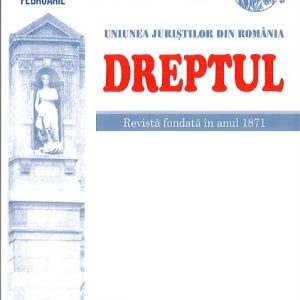 Prin Rechizitoriul din data de 18 octombrie 2013, procurorul din cadrul Parchetului de pe lângă Înalta Curte de Casație și Justiție – Secția de Combatere a Infracțiunilor Conexe Infracțiunilor de Corupție a dispus trimiterea în judecată a inculpaților: M.J. pentru săvârșirea infracțiunii prevăzute și pedepsite de art. 132 din Legea nr. 78/2000 raportat la art. 248 C.pen. 1969, P.C. pentru complicitate la săvârșirea infracțiunii prevăzute și pedepsite de art. 132 din Legea nr. 78/2000 raportat la art. 248 C.pen. 1969 și Z.P. pentru complicitate la săvârșirea infracțiunii prevăzute și pedepsite de art. 132 din Legea nr. 78/2000 raportat la art. 248 C.pen. 1969.
Prin Rechizitoriul din data de 18 octombrie 2013, procurorul din cadrul Parchetului de pe lângă Înalta Curte de Casație și Justiție – Secția de Combatere a Infracțiunilor Conexe Infracțiunilor de Corupție a dispus trimiterea în judecată a inculpaților: M.J. pentru săvârșirea infracțiunii prevăzute și pedepsite de art. 132 din Legea nr. 78/2000 raportat la art. 248 C.pen. 1969, P.C. pentru complicitate la săvârșirea infracțiunii prevăzute și pedepsite de art. 132 din Legea nr. 78/2000 raportat la art. 248 C.pen. 1969 și Z.P. pentru complicitate la săvârșirea infracțiunii prevăzute și pedepsite de art. 132 din Legea nr. 78/2000 raportat la art. 248 C.pen. 1969. -
 Following the Decisions of the Constitutional Court No 405/2016 and No 392/2017 there are numerous discussions regarding the regulation of the offence of abuse of office, provided by Article 297 (1) of the Criminal Code. The Ministry of Justice has proposed the amendment of Article 297 (1) of the Criminal Code without establishing a value threshold and without the circumstantiation of the injury caused by committing the facts, elements depending on which it can be assessed the incidence or lack of incidence of the criminal law, by ignoring the above-mentioned decisions of the Court. In the public debates organized by the Ministry of Justice different opinions have been expressed in the sense of establishing a derisory threshold of ROL 1 000, in another opinion a threshold of ROL 2 000 000, and in another opinion in the absence of any threshold, without any circumscribing of the offence of abuse of office. In the context of these discussions, we propose the adoption of the regulation of the French Criminal Code in which facts are clearly, precisely and predictably circumscribed.
Following the Decisions of the Constitutional Court No 405/2016 and No 392/2017 there are numerous discussions regarding the regulation of the offence of abuse of office, provided by Article 297 (1) of the Criminal Code. The Ministry of Justice has proposed the amendment of Article 297 (1) of the Criminal Code without establishing a value threshold and without the circumstantiation of the injury caused by committing the facts, elements depending on which it can be assessed the incidence or lack of incidence of the criminal law, by ignoring the above-mentioned decisions of the Court. In the public debates organized by the Ministry of Justice different opinions have been expressed in the sense of establishing a derisory threshold of ROL 1 000, in another opinion a threshold of ROL 2 000 000, and in another opinion in the absence of any threshold, without any circumscribing of the offence of abuse of office. In the context of these discussions, we propose the adoption of the regulation of the French Criminal Code in which facts are clearly, precisely and predictably circumscribed. -
 In this study we are making reference to the acceptance of the bill of exchange in the Republic of Moldova and in Romania. The bill of exchange includes the drawer’s order addressed to the drawee to pay to the holder of the bill of exchange (payee) the amount of money mentioned in the title. This order itself includes only an obligation of the drawer to determine the payment of the amount of money to be made to the beneficiary, as well as a designation of the person (the drawee) which is going to make the payment at maturity. But the obligation to pay the amount of money does not arise from the order given by the drawer, but from the expression of the will of the drawee itself. So only by accepting the order the drawee becomes acceptor, that is debtor of bill of exchange, and will be obliged to pay at maturity the amount of money provided by the bill of exchange. By accepting the bill of exchange, the drawee becomes the principal debtor and, as a consequence, he must be presented with the bill of exchange.
In this study we are making reference to the acceptance of the bill of exchange in the Republic of Moldova and in Romania. The bill of exchange includes the drawer’s order addressed to the drawee to pay to the holder of the bill of exchange (payee) the amount of money mentioned in the title. This order itself includes only an obligation of the drawer to determine the payment of the amount of money to be made to the beneficiary, as well as a designation of the person (the drawee) which is going to make the payment at maturity. But the obligation to pay the amount of money does not arise from the order given by the drawer, but from the expression of the will of the drawee itself. So only by accepting the order the drawee becomes acceptor, that is debtor of bill of exchange, and will be obliged to pay at maturity the amount of money provided by the bill of exchange. By accepting the bill of exchange, the drawee becomes the principal debtor and, as a consequence, he must be presented with the bill of exchange. -
 The new regulation in the civil matter, as represented by Law no. 287/2009 on the Civil Code, adapts quasi-totally the institution of the acceptance of the inheritance. In this context, this study intends to examine the problem of the acceptance of the inheritance, a valence of the law on succession option, in all the matters it comprises, to reveal the novelties brought by Law no. 287/2009 in this matter and to assess their usefulness and opportunity.
The new regulation in the civil matter, as represented by Law no. 287/2009 on the Civil Code, adapts quasi-totally the institution of the acceptance of the inheritance. In this context, this study intends to examine the problem of the acceptance of the inheritance, a valence of the law on succession option, in all the matters it comprises, to reveal the novelties brought by Law no. 287/2009 in this matter and to assess their usefulness and opportunity. -
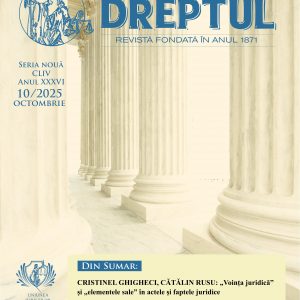
-
 The absolutisation of the effects of the case law of the Court of Justice of the European Union or of the provisions of the Charter of Fundamental Rights of the European Union in areas not falling within the exclusive jurisdiction of the European Union (EU or the Union) or in areas of shared jurisdiction where EU no longer wishes to legislate on the basis of the principles of subsidiarity or proportionality can lead to mistakes in the application of the national law by the law courts of the Member States of EU. In this article the author identifies such a case in the field of access to the data stored by the suppliers of public electronic communications networks and by the suppliers of publicly available electronic communication services and brings arguments to remedy this situation.
The absolutisation of the effects of the case law of the Court of Justice of the European Union or of the provisions of the Charter of Fundamental Rights of the European Union in areas not falling within the exclusive jurisdiction of the European Union (EU or the Union) or in areas of shared jurisdiction where EU no longer wishes to legislate on the basis of the principles of subsidiarity or proportionality can lead to mistakes in the application of the national law by the law courts of the Member States of EU. In this article the author identifies such a case in the field of access to the data stored by the suppliers of public electronic communications networks and by the suppliers of publicly available electronic communication services and brings arguments to remedy this situation. -
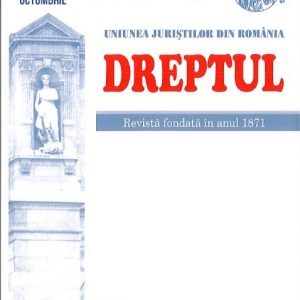 This study deals with the delicate problems of infringement of the provisions of the Constitution of Romania by the norms of the Criminal Procedure Code governing the legal regime of the action in cassation, an extraordinary means of appeal. The author of the study notes that the analyzed norms are not in agreement with the principles written in the Basic Law, invoking in support thereof, for identity of reason, the grounds of the Decision No 485 of 23 June 2015 of the constitutional contentious court.
This study deals with the delicate problems of infringement of the provisions of the Constitution of Romania by the norms of the Criminal Procedure Code governing the legal regime of the action in cassation, an extraordinary means of appeal. The author of the study notes that the analyzed norms are not in agreement with the principles written in the Basic Law, invoking in support thereof, for identity of reason, the grounds of the Decision No 485 of 23 June 2015 of the constitutional contentious court. -
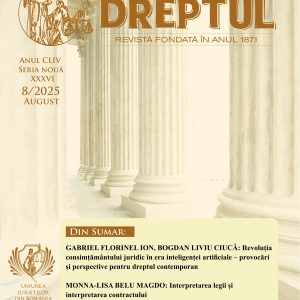
-
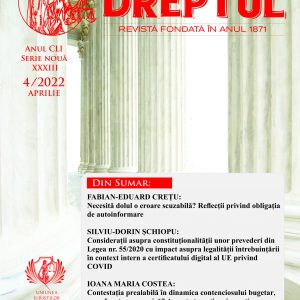
-
 In this article, the author examines the provisions of the new Criminal Code relating to the definition of railway accident, achieving a comparative examination of the current provisions. This paper is a continuation of other research in this area conducted by the author, activities which have resulted in the publication of a monograph and several articles in professional journals. Research results consist of a comparative examination of current and new provisions within the above-mentioned scope, and critical remarks. Research may be useful to theorists and practitioners in the field, especially the legislator, where the latter considers necessary to amend and supplement the definition of railway accidents. The major contribution of the article lies in author’s critical remarks, the de lege ferenda proposals concerning the definition of railway accidents, and in the need to provide another aggravated variant of offenses against railway traffic safety.
In this article, the author examines the provisions of the new Criminal Code relating to the definition of railway accident, achieving a comparative examination of the current provisions. This paper is a continuation of other research in this area conducted by the author, activities which have resulted in the publication of a monograph and several articles in professional journals. Research results consist of a comparative examination of current and new provisions within the above-mentioned scope, and critical remarks. Research may be useful to theorists and practitioners in the field, especially the legislator, where the latter considers necessary to amend and supplement the definition of railway accidents. The major contribution of the article lies in author’s critical remarks, the de lege ferenda proposals concerning the definition of railway accidents, and in the need to provide another aggravated variant of offenses against railway traffic safety. -
 Against the background of the interpenetration of the forms of legal liability for the same illicit deed, whether it is criminal, administrative, contraventional or disciplinary liability, in conjunction with the case law of the European courts attributing criminal character to some accusations beyond the legal qualification of the deed in the domestic law, a double criminal liability may be reached, thus posing the problem of the cumulation of these liabilities in terms of respecting the right not to be punished twice (ne bis in idem). Although no matter can be an exception, the issue arises mainly in areas where there are various forms of liability in the domestic law and different authorities with supervisory and sanctioning powers, such as tax evasion, public order, forestry or environmental offences or, finally, labour protection, which is of interest here. Thus, in the field of safety and health at work, the employer’s liability in the event of accidents at work may be exemplary for such situations, given that he is liable for both a criminal liability incurred by the judicial bodies and a contraventional liability established by the special bodies of the labour inspection, following that our approach will address this issue in the context of the current case law of the European courts of law (such as Case A and B v. Norway, Grand Chamber of the E.C.H.R., or the C.J.E.U. cases, Luca Menci, Garlsson Real Estate SA and Enzo Di Puma, Consob).
Against the background of the interpenetration of the forms of legal liability for the same illicit deed, whether it is criminal, administrative, contraventional or disciplinary liability, in conjunction with the case law of the European courts attributing criminal character to some accusations beyond the legal qualification of the deed in the domestic law, a double criminal liability may be reached, thus posing the problem of the cumulation of these liabilities in terms of respecting the right not to be punished twice (ne bis in idem). Although no matter can be an exception, the issue arises mainly in areas where there are various forms of liability in the domestic law and different authorities with supervisory and sanctioning powers, such as tax evasion, public order, forestry or environmental offences or, finally, labour protection, which is of interest here. Thus, in the field of safety and health at work, the employer’s liability in the event of accidents at work may be exemplary for such situations, given that he is liable for both a criminal liability incurred by the judicial bodies and a contraventional liability established by the special bodies of the labour inspection, following that our approach will address this issue in the context of the current case law of the European courts of law (such as Case A and B v. Norway, Grand Chamber of the E.C.H.R., or the C.J.E.U. cases, Luca Menci, Garlsson Real Estate SA and Enzo Di Puma, Consob). -
 In the context of the requirement to guarantee a higher level of protection of the health and safety of workers, imposed in the field even at European level 1 , the offences against labour protection are one of the ways that give expression internally to the highest legal protection in the field, satisfying both the special prevention in the field by preventing the occurrence of such events, sometimes having the most serious consequences and the need to punish more severely such deeds, when special social danger thereof requires so. The complexity of offences against labour protection lies in the often omissive and culpable conduct of the perpetrator, sometimes related to a particular specificity of the causality link between this and the state of concrete danger thus created, with special implications on the imputability of the deed, in the context of the difficult interpretation of the vast special legislation, which must, therefore, be known and correctly applied. The relevant doctrine was initiated, starting precisely with the comment on the first incrimination of this sort in the Criminal Code of Carol II of 1936, and relevant case law was found, including from the constitutional contentious court, with regard to the compliance with the principle of legality of the incrimination in terms of predictability of the rule of incrimination, short references being formulated to the European law in the matter of safety and health at work and of comparative law. Our analysis will cover the entire content of the specific offences, with reference to both the objective and the subjective typicalness of the offences against labour protection, including their pre-existing conditions, with the declared aim of supporting the practitioners in the field.
In the context of the requirement to guarantee a higher level of protection of the health and safety of workers, imposed in the field even at European level 1 , the offences against labour protection are one of the ways that give expression internally to the highest legal protection in the field, satisfying both the special prevention in the field by preventing the occurrence of such events, sometimes having the most serious consequences and the need to punish more severely such deeds, when special social danger thereof requires so. The complexity of offences against labour protection lies in the often omissive and culpable conduct of the perpetrator, sometimes related to a particular specificity of the causality link between this and the state of concrete danger thus created, with special implications on the imputability of the deed, in the context of the difficult interpretation of the vast special legislation, which must, therefore, be known and correctly applied. The relevant doctrine was initiated, starting precisely with the comment on the first incrimination of this sort in the Criminal Code of Carol II of 1936, and relevant case law was found, including from the constitutional contentious court, with regard to the compliance with the principle of legality of the incrimination in terms of predictability of the rule of incrimination, short references being formulated to the European law in the matter of safety and health at work and of comparative law. Our analysis will cover the entire content of the specific offences, with reference to both the objective and the subjective typicalness of the offences against labour protection, including their pre-existing conditions, with the declared aim of supporting the practitioners in the field. -
 Concluded on 12 December 2015, and entering into force on 4 November 2016, the Paris Agreement on Climate Change establishes the new international legal regime of the global response to threat of climate change. Contributing to the application of the Framework Convention of 1992, the Agreement adds the objective of adaptation and breaks the tradition of the Kyoto Protocol (1997), by imposing a new approach in this field, having in its center the limitation to 2°C and, whenever possible, 1,5°C of the growth of global average temperature, in relation to preindustrial levels, determined national contributions, and a transparency mechanism in ensuring the compliance of the self-assumed commitments. Accepting climate change as a „common concern of mankind” with scientific legitimacy of the conventional process and a specific legal value, being neither a „convention” nor a „protocol”, the Agreement has a universal nature, and it completes and transforms the international legal regime of the global climate action. Innovating principles are consecrated: intergenerational equity, climate justice or progression principle, new market mechanisms, with limited action, the facilitating mechanism, periodical evaluation, et al. An important role in imposing the new strategy and the new mechanism of action in climatic matters is held by the negotiations related to the post-2015 Conferences of Parties, designed to establish the „roadmap” and the proceedings for the preparation and enforcement, after 2020, of the Paris Agreement. Part of the new international conventional context regarding the new global challenges, the Agreement completes and updates the climate regime, as part of the international environmental law, bearing important specificities.
Concluded on 12 December 2015, and entering into force on 4 November 2016, the Paris Agreement on Climate Change establishes the new international legal regime of the global response to threat of climate change. Contributing to the application of the Framework Convention of 1992, the Agreement adds the objective of adaptation and breaks the tradition of the Kyoto Protocol (1997), by imposing a new approach in this field, having in its center the limitation to 2°C and, whenever possible, 1,5°C of the growth of global average temperature, in relation to preindustrial levels, determined national contributions, and a transparency mechanism in ensuring the compliance of the self-assumed commitments. Accepting climate change as a „common concern of mankind” with scientific legitimacy of the conventional process and a specific legal value, being neither a „convention” nor a „protocol”, the Agreement has a universal nature, and it completes and transforms the international legal regime of the global climate action. Innovating principles are consecrated: intergenerational equity, climate justice or progression principle, new market mechanisms, with limited action, the facilitating mechanism, periodical evaluation, et al. An important role in imposing the new strategy and the new mechanism of action in climatic matters is held by the negotiations related to the post-2015 Conferences of Parties, designed to establish the „roadmap” and the proceedings for the preparation and enforcement, after 2020, of the Paris Agreement. Part of the new international conventional context regarding the new global challenges, the Agreement completes and updates the climate regime, as part of the international environmental law, bearing important specificities. -
 This study deals with a new institution in the Romanian criminal legislation, namely the plea agreement, which is a deal of the prosecutor with the major defendant concerning the offence, the evidence, the form of guilt and the punishment imposed, all taking the form of a simplified procedure. By combining the theoretical and the practical aspects, the article is of great interest to those who apply the criminal law. Being written in a way which transcends the already known generalities regulated in the Criminal Procedure Code, the study specifically concerns the particularities and the difficulties which accompany the application of this new legal mechanism.
This study deals with a new institution in the Romanian criminal legislation, namely the plea agreement, which is a deal of the prosecutor with the major defendant concerning the offence, the evidence, the form of guilt and the punishment imposed, all taking the form of a simplified procedure. By combining the theoretical and the practical aspects, the article is of great interest to those who apply the criminal law. Being written in a way which transcends the already known generalities regulated in the Criminal Procedure Code, the study specifically concerns the particularities and the difficulties which accompany the application of this new legal mechanism. -
 Fapta asiguratului de a nu renunța la calitatea de parte civilă, deși a primit plata despăgubirilor de la asigurător, nu are semnificația unui act prin care se împiedică realizarea dreptului de regres al asigurătorului, astfel că nu se pune problema angajării răspunderii în condițiile art. 2210 alin. (2) C.civ.
Fapta asiguratului de a nu renunța la calitatea de parte civilă, deși a primit plata despăgubirilor de la asigurător, nu are semnificația unui act prin care se împiedică realizarea dreptului de regres al asigurătorului, astfel că nu se pune problema angajării răspunderii în condițiile art. 2210 alin. (2) C.civ. -
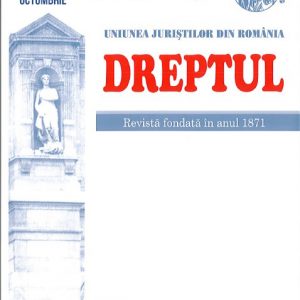 The authors plead for the distinct regulation of the manifestly illegal acts and measures showing that their legal treatment requires operative sanctions and their removal in due time having regard to their implications for human rights and fundamental freedoms. Taking into account the implications increased by the latest changes of the institution of the initiation and continuation of the criminal prosecution there are pointed out some inconsistencies of the criminal processual legislation with the provisions of the Constitution and of the European Convention of Human Rights, expressing some criticism of unconstitutionality. Thus they criticize the obligativity to initiate criminal prosecution „in rem” even when the authors are indicated or known, and make some „de lege ferenda” proposals, for the concordance of Article 304 (2), Article 305 (1), (2) and (3) and Article 339 (5) of the Criminal Procedure Code with the provisions of the Constitution.
The authors plead for the distinct regulation of the manifestly illegal acts and measures showing that their legal treatment requires operative sanctions and their removal in due time having regard to their implications for human rights and fundamental freedoms. Taking into account the implications increased by the latest changes of the institution of the initiation and continuation of the criminal prosecution there are pointed out some inconsistencies of the criminal processual legislation with the provisions of the Constitution and of the European Convention of Human Rights, expressing some criticism of unconstitutionality. Thus they criticize the obligativity to initiate criminal prosecution „in rem” even when the authors are indicated or known, and make some „de lege ferenda” proposals, for the concordance of Article 304 (2), Article 305 (1), (2) and (3) and Article 339 (5) of the Criminal Procedure Code with the provisions of the Constitution. -
 In consequence of Romania’s accession to the European Union, in recent years there have been adopted a series of laws (the Law No 315/2005 and the Law No 17/2014 and others) which establish a series of new legal provisions with reference to the acquisition, in Romania, of the right to private property and its subdivisions over land by the foreign citizens and by the stateless persons. In this study, the author makes an interesting analysis of these new Romanian legal establishments, to which it is also added the Regulation (EU) No 650/2012 of the European Parliament and of the Council (entered into force on 17 August 2015) on jurisdiction, applicable law, recognition and enforcement of decisions and acceptance and enforcement of authentic instruments in matters of successions and on the creation of a European Certificate of Succession.
In consequence of Romania’s accession to the European Union, in recent years there have been adopted a series of laws (the Law No 315/2005 and the Law No 17/2014 and others) which establish a series of new legal provisions with reference to the acquisition, in Romania, of the right to private property and its subdivisions over land by the foreign citizens and by the stateless persons. In this study, the author makes an interesting analysis of these new Romanian legal establishments, to which it is also added the Regulation (EU) No 650/2012 of the European Parliament and of the Council (entered into force on 17 August 2015) on jurisdiction, applicable law, recognition and enforcement of decisions and acceptance and enforcement of authentic instruments in matters of successions and on the creation of a European Certificate of Succession. -
 The phrase actio libera in causa designates that situation in which the perpetrator, at the time of committing a deed stipulated by the criminal law, was in a situation that excludes the imputable character of the deed. However, it must be emphasized that, at a previous moment, when the perpetrator was not under the incidence of such causes, he triggered or allowed the emergence of some states of fact that would eliminate the imputable character of the deed. In such a hypothesis, the criminal doctrine from Romania is unanimous in accepting that the person who causes his own state of incapacity will be liable under the criminal law. In order to argue the possibility that a person, at the time of committing a typical action or inaction, be liable under the criminal law, the authors of criminal law in our country have adopted the model of exception or extraordinary imputation. According to this system, the perpetrator will be liable under the criminal law for causing his own state of incapacity. Thus, the imputability, in the case of the construction of actio libera in causa, will not be analyzed at the time of committing the criminal deed, but in relation to the moment when the perpetrator caused his state of incapacity. The construction actio libera in causa, from our point of view, covers only certain hypotheses in which the perpetrator creates the appearance of existence of a cause of imputability (intoxication, irresponsibility, physical or moral constraint), and not those hypotheses, in which the perpetrator provokes the existence of a justifying cause.
The phrase actio libera in causa designates that situation in which the perpetrator, at the time of committing a deed stipulated by the criminal law, was in a situation that excludes the imputable character of the deed. However, it must be emphasized that, at a previous moment, when the perpetrator was not under the incidence of such causes, he triggered or allowed the emergence of some states of fact that would eliminate the imputable character of the deed. In such a hypothesis, the criminal doctrine from Romania is unanimous in accepting that the person who causes his own state of incapacity will be liable under the criminal law. In order to argue the possibility that a person, at the time of committing a typical action or inaction, be liable under the criminal law, the authors of criminal law in our country have adopted the model of exception or extraordinary imputation. According to this system, the perpetrator will be liable under the criminal law for causing his own state of incapacity. Thus, the imputability, in the case of the construction of actio libera in causa, will not be analyzed at the time of committing the criminal deed, but in relation to the moment when the perpetrator caused his state of incapacity. The construction actio libera in causa, from our point of view, covers only certain hypotheses in which the perpetrator creates the appearance of existence of a cause of imputability (intoxication, irresponsibility, physical or moral constraint), and not those hypotheses, in which the perpetrator provokes the existence of a justifying cause. -

-
 Din interpretarea dispozițiilor art. 1847 și următoarele și a art. 1890 C.civ. din 1864 rezultă că prescripția achizitivă trebuie opusă doar fostului proprietar al imobilului în litigiu, în considerarea efectului juridic al uzucapiunii de sancțiune civilă față de titularul nediligent care a permis ieșirea bunului din patrimoniul său. În măsura în care însă nu este posibilă identificarea fostului proprietar al terenului ce face obiectul cererii, ori a altor persoane care ar fi interesate în contestarea uzucapiunii sau acesta a decedat și nu s-a dezbătut succesiunea vacantă, calitatea procesuală pasivă se prezumă, prin dispozițiile legii, că aparține unității administrativ-teritoriale, în a cărei rază teritorială se află imobilul, ca titulare ale patrimoniului imobiliar. Prin urmare, legitimarea procesuală pasivă a unității administrativ-teritoriale nu decurge, în mod arbitrar, din faptul neidentificării unui alt pârât, ci se întemeiază pe dispozițiile art. 26 din Legea fondului funciar nr. 18/1991, relative la caracterul potențial de bun fără stăpân al terenului în litigiu. Altfel s-ar putea ajunge în situația particulară a inexistenței unei persoane care să pretindă un drept de proprietate asupra nemișcătorului, în calitate de proprietar sau de moștenitor al proprietarului inițial al terenului, la respingerea acțiunii în constatarea dobândirii dreptului de proprietate, prin efectul prescripției achizitive, deși sunt îndeplinite condițiile legale pentru a uzucapa, pe considerentul că unitatea administrativ-teritorială este lipsită de legitimare procesuală pasivă, ceea ce ar echivala cu lipsirea reclamantului de orice posibilitate de valorificare a dreptului său. (Înalta Curte de Casație și Justiție, Secția I civilă, Decizia nr. 2470 din 19 noiembrie 2020)
Din interpretarea dispozițiilor art. 1847 și următoarele și a art. 1890 C.civ. din 1864 rezultă că prescripția achizitivă trebuie opusă doar fostului proprietar al imobilului în litigiu, în considerarea efectului juridic al uzucapiunii de sancțiune civilă față de titularul nediligent care a permis ieșirea bunului din patrimoniul său. În măsura în care însă nu este posibilă identificarea fostului proprietar al terenului ce face obiectul cererii, ori a altor persoane care ar fi interesate în contestarea uzucapiunii sau acesta a decedat și nu s-a dezbătut succesiunea vacantă, calitatea procesuală pasivă se prezumă, prin dispozițiile legii, că aparține unității administrativ-teritoriale, în a cărei rază teritorială se află imobilul, ca titulare ale patrimoniului imobiliar. Prin urmare, legitimarea procesuală pasivă a unității administrativ-teritoriale nu decurge, în mod arbitrar, din faptul neidentificării unui alt pârât, ci se întemeiază pe dispozițiile art. 26 din Legea fondului funciar nr. 18/1991, relative la caracterul potențial de bun fără stăpân al terenului în litigiu. Altfel s-ar putea ajunge în situația particulară a inexistenței unei persoane care să pretindă un drept de proprietate asupra nemișcătorului, în calitate de proprietar sau de moștenitor al proprietarului inițial al terenului, la respingerea acțiunii în constatarea dobândirii dreptului de proprietate, prin efectul prescripției achizitive, deși sunt îndeplinite condițiile legale pentru a uzucapa, pe considerentul că unitatea administrativ-teritorială este lipsită de legitimare procesuală pasivă, ceea ce ar echivala cu lipsirea reclamantului de orice posibilitate de valorificare a dreptului său. (Înalta Curte de Casație și Justiție, Secția I civilă, Decizia nr. 2470 din 19 noiembrie 2020)
